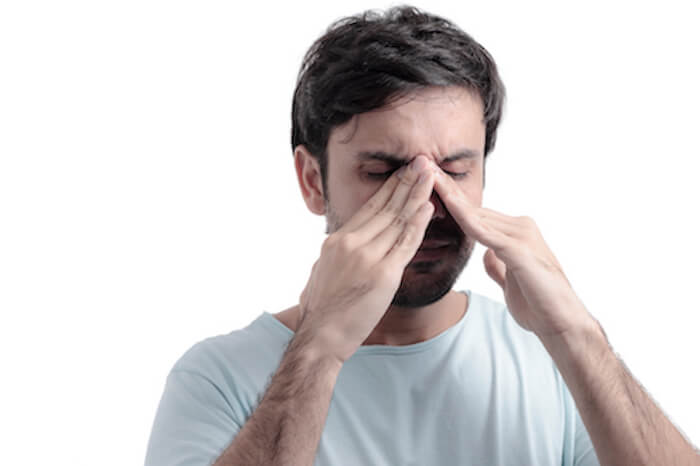Air conditioning feels great when it’s blistering hot outside, so what’s not to love? Believe it or not, there’s a growing contingent of people who believe good old AC can be bad for you. While it’s true that ramping up your air conditioning can cause some health issues, it’s not for the reasons most people think.
Here’s what science has to say about air conditioning and its relationship to asthma, headaches and sinus problems.
AC AND SINUS PROBLEMS

If you’ve ever arrived home after a day of work feeling like your sinuses were acting up for no apparent reason, the AC might be to blame. Sinus infections can arise when filters aren’t changed often enough and the cooling system isn’t properly maintained.
A neglected AC unit can also mean the building where you work is becoming a breeding ground for germs. When the air conditioning isn’t functioning at peak performance, damp areas can result in the growth of mold. Germs and mold are precisely what can cause you to have a sinus infection.
AC AND HEADACHES

People who work in air-conditioned buildings can also suffer headaches because of improperly-maintained air conditioning systems. This is even more likely to occur when the building where you work is tightly sealed with windows that can’t be opened to let fresh air inside. Breathing unventilated air can make you feel exhausted and it can give you headaches, too.
But the problem isn’t really the air conditioning. It’s the lack of maintenance of the air conditioning system that causes air quality issues. Drip pans are a source of moisture and they can harbor micro-organisms (mold), which then get circulated throughout the building, causing people to get sick or have headaches.
There’s even a name for this: Sick Building Syndrome. The HVAC system circulates mold that’s allowed to grow after a flood or around a leak or in AC unit drip pans and cooling coils. The solution is to schedule regular maintenance and cleaning of your air conditioning system.
AC AND ASTHMA

Asthma flare-ups can be caused by a number of triggers. According to the Centers for Disease Control (CDC), high humidity can trigger an attack. That’s why the Asthma and Allergy Foundation of America (AAFA) actually recommends that people who have asthma use air conditioning in their homes. Maintaining a low-humidity environment can help keep asthma attacks at bay.
Pollen is another asthma trigger so using an air conditioner can help people who are at risk of asthma attacks. Air conditioning systems filter out pollen and other irritants, such as exhaust from motor vehicles.
However, when the AC unit isn’t maintained and mold is allowed to grow in the home or office, air conditioning can become bad news for allergy sufferers. Mold and tobacco smoke are among the top triggers for asthma attacks.
LESSON LEARNED: MAINTAIN YOUR AC SYSTEM!

You’ll notice that in each of the cases described above, health problems arose only when air conditioning systems weren’t properly maintained. Filters that don’t get changed often enough are a major source of AC-related health problems. Moist breeding grounds for mold and germs can be avoided with regular cleaning and maintenance of your entire cooling system, not just the filters.
Air conditioning does a lot of good in the world. It makes home life and work environments more comfortable. It filters out pollutants. It keeps mold at bay by keeping your home dry. Don’t let unfounded myths about AC and your health keep you from enjoying these benefits. Just stay on top of maintenance and your AC should keep you cool, dry, and comfy without making you sick. On the other hand, always remember that fresh air and sunlight are crucial for your health.
YOU MAY ALSO LIKE:

SIMPLE YET DELICIOUS GREEN CABBAGE SALAD
We love cabbage at Project Wellness Now, so here is another great recipe! This green cabbage salad is very simple but

YOGA AND CONSCIOUS BREATHING FOR ANTI-AGING
By Esse Johnson I believe that a primary reason for getting older and wiser has become such a physically painful ordeal

TOOTH SENSITIVITY – WHY YOU HAVE IT, WHAT YOU CAN DO ABOUT IT
By Dr. Yvette Porter Tooth sensitivity happens when the enamel protecting your teeth gets thinner. It can also happen when gum

WHAT YOU NEED TO KNOW ABOUT YOUR SACRAL CHAKRA
The sacral chakra is the second-lowest of seven major energy centers in the human body. Located below your navel, it controls

ZEN IN A CUP: THE CALMING EFFECTS OF HERBAL TEAS
Our lives are often a busy whirlwind, with many of us searching for ways to create a sense of calm for

HOW RESTORATIVE YOGA CAN ENHANCE CHIROPRACTIC CARE
If your strategy for resolving back (or other joint) pain includes frequent visits to a chiropractor, then yoga practice (of a



